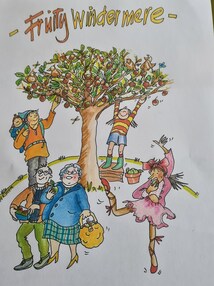Windermere Food Growing Group
|
The aim of Windermere Food Growing Group is to increase the amount of fruit and vegetables grown in the Windermere area – minus the food miles, chemicals and plastic.
The Group’s first project was ‘Tasty Tubs’ – primary school children grew edible plants in re-used containers in peat-free compost. There were plants grown in old hamster cages, old goldfish bowls, upturned umbrellas, teapots, half footballs and handbags! This was followed with a schools’ strawberry-growing project and a potato-growing project. Then ‘Fruity Windermere!’ started and goes from strength to strength. What is ‘Fruity Windermere!’? Our aim in ‘Fruity Windermere!’ is to increase the amount of fruit grown and freely available to people in the Windermere area. We started 10 years ago when we planted apple, pear and plum trees around Windermere, Bowness and Troutbeck Bridge. There are now about 50 trees and 50 fruit bushes – redcurrants, blackcurrants, whitecurrants and gooseberries. Most of them are planted on District Council-owned green spaces. The fruit is not treated with any chemicals. Where is the fruit?
Why chemical-free? Our food is often sprayed several times throughout the growing season with a cocktail of herbicides, fungicides and pesticides. Our food industry has devised hundreds of toxic combinations of chemicals to kill weeds and pests. Every time we spray one of these harmful chemicals, we forever alter the soil and the genome of the microbiome of weeds and nearby plants, as well as the animal and human food consumers. By choosing to buy only regeneratively grown food, we offer our growers support to move away from chemical farming and toward regenerative agriculture practices. Regenerative agriculture focuses on rebuilding organic matter and living biodiversity in the soil, producing nutrient-dense food each year while sequestering excess atmospheric carbon underground to help reverse climate change |
Can I pick some fruit?
Yes, please do take some and leave some for others. Check the fruit is ripe first or it will be sour and wasted. For the fruit trees, you do this by holding the fruit in your hand and giving it a gentle twist. If it comes away, it is ready, otherwise it should be left for a while to ripen. The fruit is unlikely to be ripe before mid- September. Fruit on the bushes, blackcurrants etc, is ready in late June to early July. The Group’s work has been supported by: The Taverners; Windermere Town Council; the Co-op; Lakeland Landscapes; South Lakeland District Council; and United Utilities – many thanks to them! The BT plot The BT plot is Windermere Food Growing Group’s latest project, running alongside ‘Fruity Windermere!’. It is a demonstration garden, showing that lots of our food can be grown locally without the need for chemicals, digging or plastic packaging. The plot is on the Holly Road entrance to the BT site. BT was kind enough to grant us a licence for use of the area. From an area of rough grass in April 2021, a few weeks later beans, potatoes, onions, salads, leeks, cabbages, kale and wild flowers for the pollinator insects were growing on the plot. If more people are interested in being part of the Windermere Food Growing Group team, then we can extend the plot and grow more. Some produce from the plot is donated to Windermere Food Bank. The plot is being managed without use of chemicals and without disturbing the soil by digging. |

